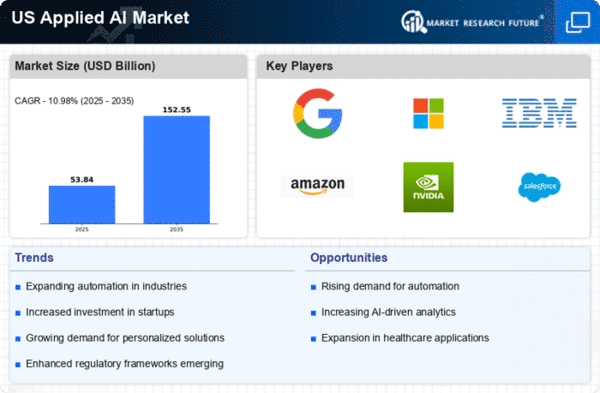Rising Demand for Automation Solutions
The applied ai market is experiencing a notable surge in demand for automation solutions across various sectors. Businesses are increasingly adopting AI technologies to streamline operations, enhance productivity, and reduce operational costs. According to recent data, the automation market is projected to reach $200 billion by 2026, with a significant portion attributed to AI-driven applications. This trend is particularly evident in manufacturing, logistics, and customer service industries, where AI systems are deployed to optimize workflows and improve service delivery. As organizations seek to remain competitive, the integration of AI into their processes is becoming essential, thereby driving growth in the applied ai market.
Expansion of AI in Healthcare Applications
The The market is significantly impacted by the expansion of AI applications in the healthcare sector.. AI technologies are being utilized for diagnostics, treatment planning, and patient management, leading to improved healthcare outcomes. The market for AI in healthcare is projected to reach $36 billion by 2025, reflecting the increasing reliance on AI-driven solutions. This growth is fueled by the need for efficient healthcare delivery and the ability to analyze large datasets for better decision-making. As healthcare providers continue to adopt AI technologies, the The market is poised for substantial growth., driven by innovations that enhance patient care.
Growing Focus on Data Privacy and Security
As the applied ai market expands, there is a growing emphasis on data privacy and security. Organizations are increasingly aware of the potential risks associated with AI technologies, particularly regarding sensitive data handling. Regulatory frameworks, such as the California Consumer Privacy Act (CCPA), are shaping how businesses implement AI solutions. Companies are investing in secure AI systems that comply with these regulations, which is likely to enhance consumer trust and drive market growth. The focus on privacy and security is not only a compliance issue but also a competitive advantage, as businesses that prioritize these aspects may attract more customers in the applied ai market.
Advancements in Machine Learning Algorithms
The applied ai market is significantly influenced by advancements in machine learning algorithms, which are becoming increasingly sophisticated and efficient. These innovations enable organizations to analyze vast amounts of data, uncover patterns, and make informed decisions. For instance, the market for machine learning is expected to grow at a CAGR of 43% from 2021 to 2028, indicating a robust interest in AI technologies. Enhanced algorithms facilitate applications in various fields, including healthcare, finance, and marketing, where predictive analytics and personalized solutions are in high demand. Consequently, the evolution of machine learning is a critical driver for the applied ai market.
Increased Collaboration Between Tech Firms and Startups
The applied ai market is witnessing a trend of increased collaboration between established tech firms and innovative startups. This synergy fosters the development of cutting-edge AI solutions that address specific industry challenges. Major corporations are investing in startups to leverage their agility and creativity, which can lead to the rapid deployment of AI technologies. This collaborative approach is expected to enhance the overall ecosystem, driving innovation and market expansion. As a result, the applied ai market is likely to benefit from a diverse range of solutions that cater to various sectors, further propelling its growth.
















